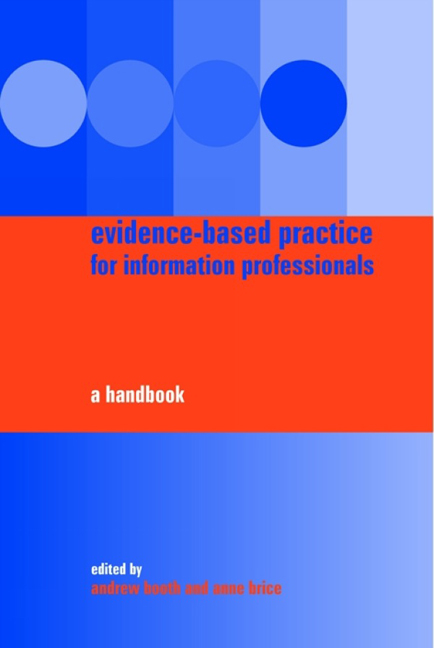Book contents
- Frontmatter
- Contents
- Foreword
- Editors and contributors
- Part 1 The context for evidence-based information practice
- Part 2 Skills and resources for evidence-based information practice
- Part 3 Using the evidence base in practice
- 13 Six domains of evidence-based information practice
- 14 Examining the evidence base for reference services and enquiry work
- Special Topic (A) Provision of a current awareness service for research staff (Guideline)
- 15 The contribution of evidence-based practice to educational activities
- Special Topic (B) How can I train my users? (Evidence Digest)
- 16 An evidence-based approach to collection management
- Special Topic (C) Electronic or paper: how do I manage my journals collection? (Evidence Digest)
- 17 Towards evidence-based management
- Special Topic (D) How do I measure the impact of my service? (Guideline)
- Special Topic (E) Should I charge and, if so, what should I charge for? (Evidence Briefing)
- 18 Evidence-based perspectives on information access and retrieval
- Special Topic (F) What are the characteristics of a good searcher? (Critically Appraised Topic)
- Special Topic (G) Which database, which interface? (Guideline) 251
- 19 Introducing an evidence-based approach to marketing and promotional activities
- Special Topic (H) Determining the information needs of practising nurses postregistration in the UK from 1990 to 2003 (Evidence Digest)
- 20 A future for evidence-based information practice?
- Index
Special Topic (E) Should I charge and, if so, what should I charge for? (Evidence Briefing)
from Part 3 - Using the evidence base in practice
Published online by Cambridge University Press: 08 June 2018
- Frontmatter
- Contents
- Foreword
- Editors and contributors
- Part 1 The context for evidence-based information practice
- Part 2 Skills and resources for evidence-based information practice
- Part 3 Using the evidence base in practice
- 13 Six domains of evidence-based information practice
- 14 Examining the evidence base for reference services and enquiry work
- Special Topic (A) Provision of a current awareness service for research staff (Guideline)
- 15 The contribution of evidence-based practice to educational activities
- Special Topic (B) How can I train my users? (Evidence Digest)
- 16 An evidence-based approach to collection management
- Special Topic (C) Electronic or paper: how do I manage my journals collection? (Evidence Digest)
- 17 Towards evidence-based management
- Special Topic (D) How do I measure the impact of my service? (Guideline)
- Special Topic (E) Should I charge and, if so, what should I charge for? (Evidence Briefing)
- 18 Evidence-based perspectives on information access and retrieval
- Special Topic (F) What are the characteristics of a good searcher? (Critically Appraised Topic)
- Special Topic (G) Which database, which interface? (Guideline) 251
- 19 Introducing an evidence-based approach to marketing and promotional activities
- Special Topic (H) Determining the information needs of practising nurses postregistration in the UK from 1990 to 2003 (Evidence Digest)
- 20 A future for evidence-based information practice?
- Index
Summary
What are my objectives in charging?
‘Before introducing charges for any service it is essential to consider where the service sits within your long-term objectives and priorities and establish that: there is a need for the service; there is a willingness to pay; and you have the appropriate resources and skills to take it forward’ (Webb, 2003). You must decide what your objectives are in charging. For instance:
• are you trying to produce value-for-money outcomes? (Cooper, 1997)
• are you attempting to make a profit, recover costs or control excessive use? Libraries are often more concerned to recover costs than to make money, e.g. ‘cost-minus pricing’, providing subsidized services below costs (Snyder and Davenport, 1997)
• is the charged-for service peripheral (e.g. a service to ‘non-core’ users) or integral to what the library offers (e.g. passing on costs to internal users)?
Answers to such questions will generate very different pricing strategies (Ward et al., 2002).
Libraries should establish a pricing mechanism only after determining the implications of such a policy on performance and utilization of library services (elasticity analysis) (Olaisen, 1992).
What are my motives?
Possible reasons for charging include:
• to generate revenue
• to recover costs, in whole or in part
• to benefit from users’ ability and willingness to pay
• to control usage (Snyder and Davenport, 1997) e.g. by ‘non-core’ users
• conversely, as outreach to ‘non-core’ users (Ward et al., 2002)
• to bring a service in line with ‘competitor services’ (Ward, 1997)
• to provide ‘value-added’ services e.g. a new or upgraded service. If a service benefits only a small proportion of library users, they may be expected to pay (Snyder and Davenport, 1997)
• to create a measure of value, aiming to demonstrate – e.g. to funding bodies – that information (and by extension the information expert! (Webb, 2003, 5)) is viewed as a valuable commodity
• as the only way to afford some services at all (Snyder and Davenport, 1997).
What services might I charge for?
Table E.1 suggests possible services that might be charged for:
You should not introduce charges randomly for existing, unchanged, previously free services (Webb, 2003). Previous demand from existing users does not necessarily convert into sales. You may need to look more broadly and recruit new clients (Webb, 1994).
- Type
- Chapter
- Information
- Evidence-based Practice for Information ProfessionalsA Handbook, pp. 223 - 230Publisher: FacetPrint publication year: 2004



